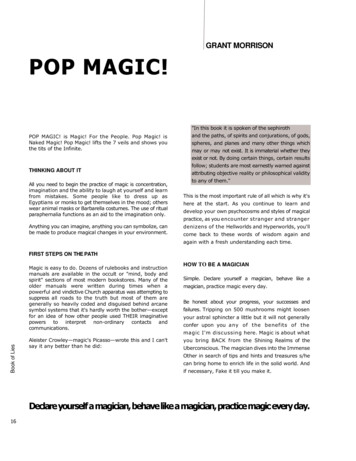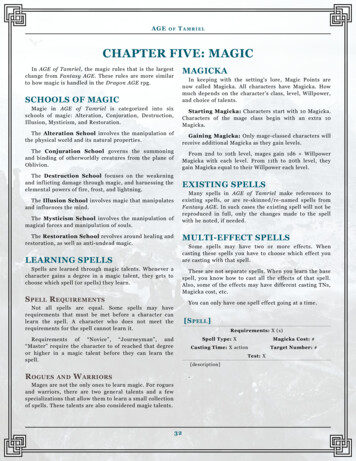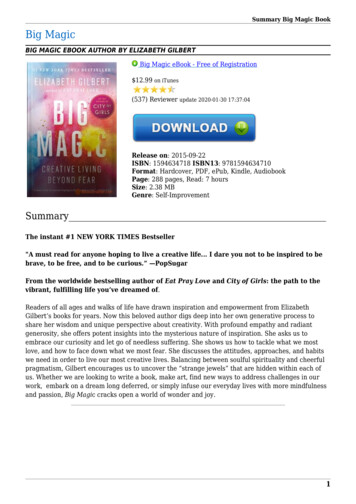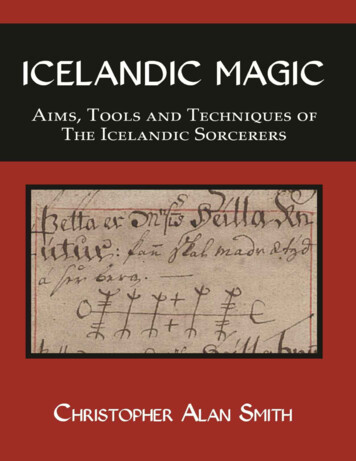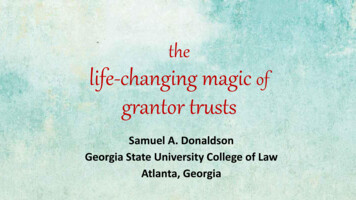
Transcription
thelife-changing magic ofgrantor trustsSamuel A. DonaldsonGeorgia State University College of LawAtlanta, Georgia
Our Agenda History of the Grantor Trust Rules When to Use (and Not to Use) a Grantor Trust Third-Party Grantor Trusts Choosing the Right Powers for Grantor Trust Status Drafting Issues with Grantor Trusts Fun and Games with Grantor Trusts Income Tax Reporting
Put incomeproducing assetsin trusts to savefederal incometax!
Subchapter J – Estates, Trusts, Beneficiaries, and DecedentsPart I – Estates, Trusts, and BeneficiariesSUBPART E – GRANTORS AND OTHERS TREATED AS SUBSTANTIAL OWNERSSection 671 – Trust income, deduction, and credits attributable to grantorsand others as substantial ownersSection 672 – Definitions and rulesSection 673 – Reversionary interestsSection 674 – Power to control beneficial enjoymentSection 675 – Administrative powersSection 676 – Power to revokeSection 677 – Income for benefit of grantorSection 678 – Person other than grantor treated as substantial ownerSection 679 – Foreign Trusts having one or more United State beneficiaries
Oh no!
Hmm. MaybeI want agrantor trust!
Do I want a grantor trust?1. Defer / avoidstate income tax1. Pay less federalincome tax2. Allow for latertransactions withthe trust2. Maximizecertain deductions(§199A, state andlocal taxes, taxprep fees,charitablecontributions)
Third-Party Grantor TrustsImputing ownership to someone other than the grantorSection 678 Trusts, akasometimes as “BeneficiaryDeemed-Owner Trusts”(BDOTs)Section 679 Trusts, aka“Foreign Grantor Trusts”
Section 678 TrustsBeneficiary Deemed-Owned Trusts (BDOTs)Section 678(a) GENERAL RULE A person other thanthe grantor shall be treated as the owner of anyportion of a trust with respect to which:(1) such person has a power exercisable solelyby himself to vest the corpus or the incometherefrom in himself, or(2) such person has previously partially releasedor otherwise modified such a power and afterthe release or modification retains such controlas would, within the principles of sections 671to 677, inclusive, subject a grantor of a trust totreatment as the owner thereof.B.D.O.T.Power to withdrawall of the trust’s nettaxable income
Section 679 TrustsForeign Grantor TrustsPropertyForeignTrustMay be taxableif Trust isseparate entityUnited States personTreated as owner ofgifted propertyUnited States beneficiary
Powers that DON’T result in a Grantor TrustGROSS ESTATE INCLUSION Testamentary power to controldistributions Power to appoint income orprincipal to a charity of thegrantor’s choice Power to control timing ofdistributionsSTEPPED-UP BASIS!NO GROSS ESTATE INCLUSION Mere administrative power Power to distribute limited by anascertainable standard Power to withhold income duringminority or disability Independent trustee power todistribute (unless G can replace)
“DEFECTIVE” GRANTOR TRUSTGrantor Trust Powers GROSS ESTATE INCLUSIONMost reversionsMost powers to control distributionsduring grantor’s lifeTestamentary power to appointaccumulated incomeGrantor power to deal trust propertyfor less than full considerationGrantor power to vote to controlledcorp. stock in non-fiduciary capacityRetained right to incomeSTEPPED-UP BASIS! NO GROSS ESTATE INCLUSIONLOAN POWERACTUAL LOAN(S)POWER TO ADD CHARITABLEBENEFICIARYSWAP POWERNonadverse party power to deal trustproperty for less than fullconsiderationThird-party nonfiduciary power to votestock or control stock investments
Creating Defective Grantor Trusts LOAN POWER Power held by Grantor or Nonadverse Party Enabling Grantor to borrow on unsecured basis Expressly contained in trust instrument ACTUAL LOANS Grantor or Grantor’s Spouse has actually borrowed from the trust On an unsecured basis Not repaid on the first day of the taxable year Trustee is not Grantor, Spouse, or a Related / Subordinate Party
Creating Defective Grantor Trusts POWER TO ADD CHARITABLE BENEFICIARY Power held by anyone other than Grantor To add 1 charities as beneficiaries Without consent of an Adverse Party SWAP POWER Power held by anyone Exercisable in a nonfiduciary capacity To reacquire trust property by substituting property of equivalent value
Exercise Swap Powers!(1) LEVERAGE THE STEP-UP IN BASISCA HLow-Basis Asset(s) NO GIFT NO GAIN NO ADDED G.E. INCLUSIONGRANTORTRUST
Exercise Swap Powers!(2) PRESERVE LOSSESLoss Asset(s)Low-Basis Asset(s)GRANTORTRUST
Exercise Swap Powers!(3) ELUDE THE 3-YEAR RULELife Insurance PolicyCa h or Assets NO GAIN NO TRANSFER FOR VALUE NO GIFT G.E. INCLUSION LIMITEDGRANTORTRUST
Exercise Swap Powers!(4) CONTROL CASH FLOWNew Asset(s)Old Asset(s)G.R.A.T.
Exercise Swap Powers!(5) TAX-FREE Q.P.R.T.Ca h NO GIFT NO NEED TO SURVIVE RENT IS NOT A GIFTGRANTORTRUST
Beware the Swap!High-Basis Asset(s)Low-Basis Asset(s)GRANTORTRUST
Drafting Issues Crummey Powers Life Insurance as a Trust Asset Tax Reimbursement Clause Toggling Grantor Trust Status
Should I give grantor trustbeneficiaries a “Crummey Power”? Revenue Ruling 81-6: A Crummey power renders the beneficiarytaxable under §678(a). Regulation §1.671-3(a)(3): Beneficiary taxed on a fractional share ofthe trust’s income. Section 678(b): Section 678(a) does not apply “with respect to apower over income if the grantor of the trust is otherwise treatedas the owner [for income tax purposes].”
Life Insurance as aGrantor Trust Asset An irrevocable life insurance trust (ILIT) is agrantor trust where income may be used topay policy premiums [§677(a)(3)] Revenue Ruling 2011-28 a swap power isnot an “incident of ownership” that willcause the policy death benefit to beincluded in the grantor’s gross estate Revenue Ruling 2007-13 transfer of policyfrom one grantor trust to another is not a“transfer for value” for income tax purposes
Tax Reimbursement Clauses Revenue Ruling 2004-64 generally favorable Grantor’s payment of tax on trust income NOT a gift to the beneficiaries Discretionary tax reimbursement clause does not cause gross estate inclusion andis not a deemed gift from the beneficiaries (assuming no understanding thattrustee will exercise discretion in grantor’s favor) Mandatory tax reimbursement clause DOES cause gross estate inclusion under§2036(a)(1) But be careful here too! Generally better for Grantor to pay tax instead of trust Potential creditor problems
Toggling Grantor Trust Status TURNING GRANTOR TRUST STATUS “ON” Springing power Power conferred by trust protector Actual loans to grantor / grantor’s spouse TURNING GRANTOR TRUST STATUS “OFF” Renounce power Decant to a nongrantor trust
Installment Sale TransactionsSpousal Grantor Trust SalesGrantor-Retained Annuity Trusts (GRATs)
Installment Sale TransactionsAsset(s)Promissory Note NO GIFT NO GAIN INTEREST TAX-FREE FIXED GROSS ESTATEINCLUSIONInterest at AFR;balloon payment of principalGRANTORTRUSTAsset(s) Growth
Installment Sale Transactions(1)Do I disclose the sale transaction ona gift tax return?(2)What happens if the grantor diesbefore the note has been repaid?(3)What is the trust’s basis in theproperty purchased from thegrantor?
Spousal Grantor Trust SalesAsset(s)Promissory Note NO GIFT NO GAIN [§1041]SPOUSE’SGRANTORTRUSTInterest at AFR;balloon payment of principal INTEREST TAXABLE? GROSS ESTATE INCLUSION?Trustee /Beneficiary
GRATsAsset(s)Fixed annuity payments GIFT OF REMAINDER AT FORMATION NO GAIN NO GROSS ESTATE INCLUSION IF SURVIVE TERMG.R.A.T.Asset(s) Growth
Income TaxReporting
Three Options to Report Grantor Trust Income THE 1041 METHOD Trust files (and gives grantor) blankForm 1041 with trust tax itemsattached on separate statement THE W-9 METHOD Grantor gives Form W-9 to trustee whoforwards it to all trust payors THE 1099 METHOD Trustee files Forms 1099 for allpayments listing trust as payor andgrantor as payee
thelife-changing magic ofgrantor trustsSamuel A. DonaldsonGeorgia State University College of LawAtlanta, Georgia
Life Insurance as a Grantor Trust Asset An irrevocable life insurance trust (ILIT) is a grantor trust where income may be used to pay policy premiums [§677(a)(3)] Revenue Ruling 2011-28 a swap power is not an "incident of ownership" that will cause the policy death benefit to be included in the grantor's gross estate


